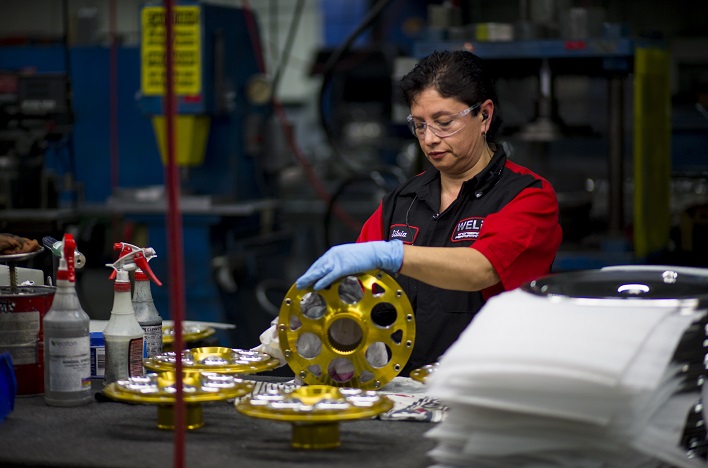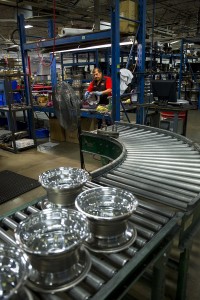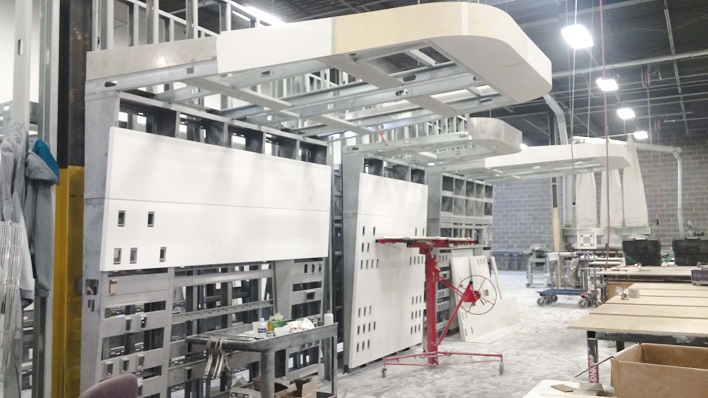Forget what you heard. Manufacturing continues to create opportunities for the U.S. and Kansas City.
“America doesn’t make anything anymore.”
While it’s true that we’re no longer the world’s largest manufacturer—China claimed the title in 2010—anyone who says American manufacturing is dead is dead wrong. Even at No. 2, the United States generated $2.1 trillion in value-added manufacturing in 2014. That’s more than the next three largest manufacturers—Japan, Germany and Mexico—combined.
Here in Kansas City, nearly 2,000 manufacturers directly employ more 76,000 people, according to 2012 numbers compiled by the Mid-America Regional Council. The impact is even higher when you consider the multiplier effect—every manufacturing position in turn supports more jobs in the economy.
Kansas City’s auto industry, for example, has a multiplier effect of 3.3, MARC found. For every 10 auto industry jobs, another 23 are created in the larger community.
Automotive production accounted for $1.3 billion of Kansas City’s exports in 2014, the single largest category. At its Claycomo facility, Ford directly employs just under 7,500 people. General Motors’ Fairfax plant has about 3,500 workers. Scores of other companies have facilities here so they can supply both plants. The Brookings Institution has called Kansas City the nation’s second biggest auto production hub after Detroit.
‘It’s Just a Good Place’
About three-quarters of U.S. manufacturers employ fewer than 20 people, according to the National Association of Manufacturers.
Just look at C&R Manufacturing, a Shawnee company that makes component parts that other equipment manufacturers use in their own products. Though it has a head count of about 20 employees, it’s been called one of the top 10 shops of its kind in the country.
This year’s business has been a little flat, but averaged out over five years, the company enjoys double-digit growth in annual revenue, owner Ron Wosel said.
Thanks to its variety in clients, “we’re probably more diverse than a lot of the shops in town, and I think that helps our averages a lot,” he said.
His daughter, Andrea, echoed that. She works in the company as a project manager and next-generation owner. As a whole, she said, Kansas City has a wide range of manufacturing strengths.
“We’re not necessarily too concentrated in one business area, such as aircraft or automobile, like certain cities,” she said. “It’s just a good place for a lot of different businesses.”
Not that everything is perfect: A strong U.S. dollar has complicated things for manufacturers whose products are shipped overseas. The recent weakness in the oil and petroleum industry has hurt those who make machinery for that field.
Last year, the Brookings Institution singled out Kansas City as “lagging” in STEM graduation rates, which can affect a city’s ability to produce innovative products.
But the region’s manufacturing industry isn’t shrinking by any means, said Mark Chalfant, CEO of the Mid-America Manufacturing Technology Center (MAMTC). The organization provides manufacturing consulting services to companies across Kansas.
As costs rise for international production, “I think companies are weighing heavily the true cost of overseas production,” Chalfant said.
Kansas City is well positioned to attract manufacturers because of its logistics infrastructure, competitive utility costs and other factors, said Chris Gutierrez, the president of KC SmartPort. The nonprofit helps recruit manufacturers and other freight-based businesses to Kansas City
Part of the problem is that many prospective businesses don’t know anything about Kansas City.
“If we can get a client here,” Gutierrez said, “they fall in love with Kansas City.”
Taking the Wheel
WELD is a good example of Kansas City’s automotive talent. The company makes high-performance wheels for racing teams and other demanding users.
In the past 12 months, WELD has completed two significant acquisitions: HiPer Technology of Lawrence and CCW Forged Performance of Florida. WELD is moving those companies’ operations to Kansas City. As a result, it has expanded the size of its manufacturing floor by 40 to 50 percent.
Being located in Kansas City has been an advantage for WELD.
Most of its competition is based on the coasts, especially in southern California, said Chris Bovis, WELD’s vice president of marketing. And those competitors tend to face higher regulatory burdens as a result.
The coasts might have a larger pool of talent, but there’s also more competition for those workers. WELD is able to retain its employees for a longer period of time. Average tenure is over 10 years.
“We bring new people in, but they stay an awful long time,” Bovis said. WELD turns 50 next year.
“We’re in an industry where you’ve been around a long time if you’ve been around for eight years,” Bovis said.
Middle of the Map
North Kansas City’s Shield Casework, is a new company spun off from another local manufacturer, Dimensional Innovations, which produces exhibits, signage and architectural design elements for Sprint, AMC, the Miami Marlins and other high-profile clients.
Shield took that expertise and uses it to produce solid-surface furniture for hospitals, locker rooms, retailers and other clients. Clients like the products’ nonporous surface because it’s durable, beautiful and easy to clean—even Sharpie marks come off quickly. And unlike laminate or metal furniture, which chip and dent, solid surface is easier to repair.
You can find Shield Casework’s furniture in the locker rooms of the Denver Nuggets and the Charlotte Hornets, as well as the University of California-San Diego Jacobs Medical Center and the University of Kansas.
While Shield Casework does a lot of work for out-of-state and even international clients, it still makes sense to be based in Kansas City, said Mandy Stark, the company’s director of sales and marketing. Being centrally located cuts down on travel and shipping time.
Sometimes the company does run into a perception problem, she acknowledged.
“I think people on the coasts think everybody in Kansas City rides a cow to work,” Stark said, laughing. Shield’s team has to bring people up to speed about Google Fiber and some of the other benefits of Kansas City.
“It’s just a matter of education,” Stark said.
Proud as a Parent
Being centrally located has actually created a new source of revenue for Jakobe Furniture.
The Kansas City, Kan., company is best known for the booths, tables and assorted furniture it constructs for restaurants and hotels. Its portfolio of clients includes Drunken Fish, The Mixx, JJ’s Restaurant and many other well-known Kansas City eateries.
But Jakobe Furniture also has launched a secondary business where it will store or even procure other items for its clients, owner Jeff Gray said.
Let’s say a client is opening a new hotel, but doesn’t have space to store ovens and other appliances. Jakobe can order those items of behalf of the customer and warehouse them until the customer is ready.
“We basically become that one source to make sure it gets to the job site on time,” Gray said.
The company has been doing very well because both the restaurant and hotel industries have been expanding, Gray said.
He founded the company in 2004. While a lot of competitors say their products are the best quality, Gray actually has proof. In 12 years, not a single person has needed to invoke Jakobe’s lifetime guarantee of its seats’ and booths’ frames.
He’s proud of what he and his team have been able to accomplish.
“I love looking at our products,” he said. “There’s that sense of pride, like looking at your own child.”




